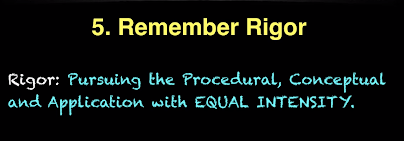On Rigor...
Recently I attended a webinar with Alex Kajitani, former Teacher of the Year in CA, current teacher, author, and is known widely as the "Rappin' Mathematician". In this, he provided the clearest and most thought-provoking definition of RIGOR that I have come across:
This got me thinking about what other ingredients need to go into something to make it rigorous...
Robyn Jackson, a National Board-Certified English teacher, speaker, and author provided 4 requirements for something to be rigorous in this video for ASCD.
Rigorous experiences will require students to:
- make meaning for themselves
- impose structure on information
- take individual skills and put them together to create a process
- apply what they have learned in new and novel situations
Let's examine assessment for a moment. Assessments are supposed to be rigorous, right? But what does that mean exactly?? As I reflect on my own past practice here is what I did:
- my attempts to create rigorous test questions usually meant complex procedural questions
- I usually prescribed how students we supposed to solve problems (i.e. solve this using the ____ method)
- most test questions were identical to the questions on the review with the exception (sometimes) of different numbers
I don't think that these past assessment practices, that I still see online and in classrooms, meet any part of the above-mentioned ways of looking at rigor. I was always astounded that there were always students who did not do well, and I put it on the kids. "How could they not do well when they knew EXACTLY what was going to be on the test?!!??" My new thinking is that maybe they didn't do well BECAUSE it wasn't rigorous and my questions had ZERO meaning for students. I could even dive down the rabbit hole that rigorous tasks are also more culturally relevant and equitable than what I did in the past!! But that's for another time...
Another question to ask in assessment: Should a student's notes be allowed to be used? Would that make this less rigorous? I suppose the answer depends on the definition of rigor that you are using. If we are using the definition of rigor that I used to use (put some really complex procedural questions on there), then yep, allowing students to use the recipe (their notes) would reduce the rigor. BUT, only through the procedural lens!
If we are encouraging rigor, utilizing notes should be encouraged, not discouraged. Jo Boaler and Carol Dweck are both well know for their research into Mindset. They both hold firmly that regurgitation of facts and being fast at it both contribute to a fixed mindset in learners. Bringing us back to rigor, maybe a growth mindset (using your bubblegum brain) is bolstered by rigorous experiences in classrooms and life!


Comments
Post a Comment